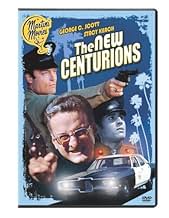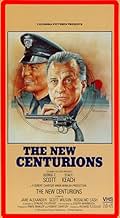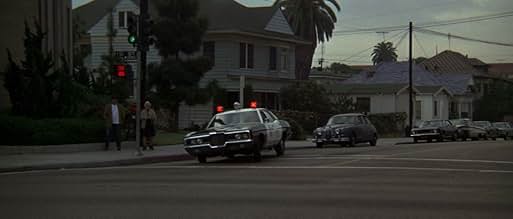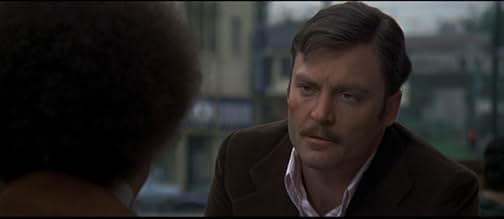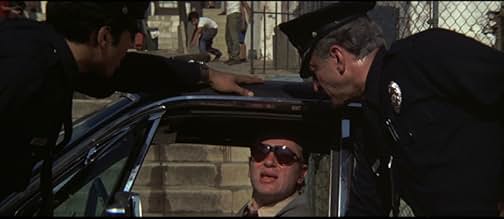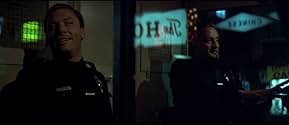IMDb RATING
7.0/10
3.7K
YOUR RATING
Family man Roy Fehler joins the L.A.P.D. to make ends meet while finishing law school and is indoctrinated by seasoned veteran Kilvinski. As time goes on, Roy loses his ambitions and family ... Read allFamily man Roy Fehler joins the L.A.P.D. to make ends meet while finishing law school and is indoctrinated by seasoned veteran Kilvinski. As time goes on, Roy loses his ambitions and family as police work becomes his entire life.Family man Roy Fehler joins the L.A.P.D. to make ends meet while finishing law school and is indoctrinated by seasoned veteran Kilvinski. As time goes on, Roy loses his ambitions and family as police work becomes his entire life.
- Director
- Writers
- Stars
Richard E. Kalk
- Milton
- (as Richard Kalk)
Peter De Anda
- Gladstone
- (as Peter DeAnda)
- Director
- Writers
- All cast & crew
- Production, box office & more at IMDbPro
Featured reviews
Joseph Wambaugh has written a lot of great books over the four decades of his literary career. My experience with him started in eighth grade in 1972 when I read The New Centurions, a blisteringly honest and terrifying book about the lives of three rookie patrolman in LA during the early 60s. It was easily the most grown-up book I had ever read (my mom thumbed through it and was appalled at the language; yet she let me finish it) and when I got to see the 1972 movie (butchered on NBC in '73 or '74), I had reread it and knew everything the little old ladies with the scissors had hacked out. Even with the obligatory mangling for our living room sensibilities, Richard Fleischer's film is a well-acted and gritty TV-looking version of Wambaugh's great, searing novel.
For the most part, the casting--THE critical step to putting the book on screen--was dead on. Stacy Keach nails Roy Fehler, George C. Scott is a slightly more buff, less urbane Andy Kilvinsky, and Jane Alexander (who is beautiful because she isn't) embodies Fehler's estranged wife, Dorothy). My only complaint is in casting Erik Estrada as Sergio. I know why he was picked--a blonde Hispanic would have confused viewers who had not read the book, but some skilled writing may have gotten the real Sergio across on screen. This is no insult to Estrada. He's hardly on screen, but this was before the excremental CHIPS, the show that ruined his career while making him a household name, and he is quite good for the few minutes we get him.
The problem with The New Centurions is that, since it is designed for mass consumption, it has been rendered more TV cop drama than searing expose of urban policing. It looks authentic, but the color and depth of the images never really fill the wide screen, dooming it to look like it belongs on the small one.
In comparison though, this is a much more successful adaptation of a Wambaugh work than the open-mouthed horror of Robert Aldrich's The Choirboys. That book was even more dark (how Wambaugh was able to make such a brutal novel so funny is still an amazement to me), but the 1977 movie was about as awful--and unfunny--as you could ever hope to miss.
Which, in comparison, makes The New Centurions all the better. Don't get me wrong, TNC is a flawed film, but it is a good one on the whole. I would just, strongly, suggest you read the book--and The Choirboys--first to get the real flavor of one of America's better crime writers (and social critics).
For the most part, the casting--THE critical step to putting the book on screen--was dead on. Stacy Keach nails Roy Fehler, George C. Scott is a slightly more buff, less urbane Andy Kilvinsky, and Jane Alexander (who is beautiful because she isn't) embodies Fehler's estranged wife, Dorothy). My only complaint is in casting Erik Estrada as Sergio. I know why he was picked--a blonde Hispanic would have confused viewers who had not read the book, but some skilled writing may have gotten the real Sergio across on screen. This is no insult to Estrada. He's hardly on screen, but this was before the excremental CHIPS, the show that ruined his career while making him a household name, and he is quite good for the few minutes we get him.
The problem with The New Centurions is that, since it is designed for mass consumption, it has been rendered more TV cop drama than searing expose of urban policing. It looks authentic, but the color and depth of the images never really fill the wide screen, dooming it to look like it belongs on the small one.
In comparison though, this is a much more successful adaptation of a Wambaugh work than the open-mouthed horror of Robert Aldrich's The Choirboys. That book was even more dark (how Wambaugh was able to make such a brutal novel so funny is still an amazement to me), but the 1977 movie was about as awful--and unfunny--as you could ever hope to miss.
Which, in comparison, makes The New Centurions all the better. Don't get me wrong, TNC is a flawed film, but it is a good one on the whole. I would just, strongly, suggest you read the book--and The Choirboys--first to get the real flavor of one of America's better crime writers (and social critics).
Stacy Keach and George C. Scott star in this very gritty, very honest portrayal of early-70s police life. It's directed by Richard Fleischer, who usually worked on much flashier material than this. I've seen a lot of films that dug in and tried to paint a clear image of police life, but this story brings a level of realism that is somewhat missing in most cases - it was written by a cop (Joseph Wambaugh).
"The New Centurions" is a title that hints at a much deeper perspective into familiar territory. Even though all the suspected clichés are still somewhat in place, they're there out of reality rather than just filling space in a movie plot. George C. Scott's character is on his way to retirement, but instead of him not making it, he takes a much darker path. It's that darker path, and the sense of hope behind it, that informs both Scott and Keach in their fantastic performances. They're as good as they'd ever been here - deep, powerful, and incredibly personal. There's a real emotional vulnerability on display that can't be denied.
"The New Centurions" is a title that hints at a much deeper perspective into familiar territory. Even though all the suspected clichés are still somewhat in place, they're there out of reality rather than just filling space in a movie plot. George C. Scott's character is on his way to retirement, but instead of him not making it, he takes a much darker path. It's that darker path, and the sense of hope behind it, that informs both Scott and Keach in their fantastic performances. They're as good as they'd ever been here - deep, powerful, and incredibly personal. There's a real emotional vulnerability on display that can't be denied.
Wanting a better life for his family, Keach enlists with the LAPD to supplement his wife's meagre income while he attends law school. But the job soon becomes all consuming leading to the breakdown of his marriage to Alexander whose support wanes in the face of constant neglect playing second fiddle to the force. In turn, Keach loses touch with reality whereby he questions his motivations for remaining in situ, but the job compels him to endure. After a litany of setbacks, alcoholic and facing ruin, he's briefly resurrected by Cash, taking pity on his misguided loyalty, and helping him to re-discover the purpose he once idealised. Rich, rewarding tale of an everyday struggle is told in a rather grim but entertaining fashion by accomplished director Fleischer.
Despite solid performances from Keach and Alexander in particular, this is George C.Scott's movie, as the maverick older statesman with nothing but the badge to define his identity. His character is a scene stealer, and is at times, fierce, frightening, benevolent and ultimately, very bleak. The highly emotional scene in which Scott telephones Keach and relays the metaphor of the old man and his burglar, resonates throughout the remainder of the film, and beyond.
There's not the synergism that you'd expect and if it weren't for the distinction that Scott, Alexander and Wilson as the modest rookie, each bring to their respective characterisations, "The New Centurions" would be just another police story, and this is evidenced to a degree when their characters are no longer in focus. A very capable and vast supporting cast bring a gritty reality, and the story ebbs and flows toward a sudden and unexpected climax. The anguish experienced by the characters is palpable, and every time the mood brightens, there's another catastrophe waiting. Probably not the movie to watch before joining the academy, but highly entertaining and thought-provoking nonetheless.
Despite solid performances from Keach and Alexander in particular, this is George C.Scott's movie, as the maverick older statesman with nothing but the badge to define his identity. His character is a scene stealer, and is at times, fierce, frightening, benevolent and ultimately, very bleak. The highly emotional scene in which Scott telephones Keach and relays the metaphor of the old man and his burglar, resonates throughout the remainder of the film, and beyond.
There's not the synergism that you'd expect and if it weren't for the distinction that Scott, Alexander and Wilson as the modest rookie, each bring to their respective characterisations, "The New Centurions" would be just another police story, and this is evidenced to a degree when their characters are no longer in focus. A very capable and vast supporting cast bring a gritty reality, and the story ebbs and flows toward a sudden and unexpected climax. The anguish experienced by the characters is palpable, and every time the mood brightens, there's another catastrophe waiting. Probably not the movie to watch before joining the academy, but highly entertaining and thought-provoking nonetheless.
This film, aside from its very special status mentioned above, is quite worthwhile and entertaining. It is an excellent George C. Scott vehicle, well-directed, well-scripted and well edited!
Like other quality police dramas, it has several intertwined seamlessly integrated storylines, none of which is left unresolved, or most of which are left unresolved, when the end credits begin to roll...depending on your point of view! At times, onscreen events resonant with such realism that it lends a dimension of docudrama to the overall production.
CENTURIONS clearly transmits the boring nature of most of the daily, moment to moment activities that permeates police work, while, at the same time, emphasizing that this aspect of the job must be tempered by a heightened awareness intrinsic to survival owing to the ever-present possible reality of life-threatening scenarios on a one second event horizon! These "Men In Black" would, undoubtedly, prefer to live in a world where all their on-the-job decision options were delineated by a simple Black or White distinction. The reality of the New Centurions is that they clearly come in every imaginable shade of gray! Scott's cynical, scarred, veteran, Kilvinski, nearing retirement, has constructed a reality where his quasi-legal technique of locking up street-walkers in his paddy wagon and driving them around all night to keep the streets "clean and decent" is a necessary evil with which he feels, at least, reasonably comfortable!
Keach's enthusiastic and idealistic rookie, Fehler, oozes frustration from every pore, as he perceives the lifeblood of his initial optimism being drained, drop by drop, by the cold, hard cement indifference of L. A.'s Mean Streets! Viewing, impotently, as both his marriage and his upbeat rookie positivism flounder in an ocean of problems, he finds consolation and support in the arms of a sensitive and empathetic nurse, played by Rosalind Cash.... Here is where I will reference the "Unheralded Epic First in Cinema History": I suppose that today´s world, or in a perfect world.... we are not supposed to notice or mention a good number of things because we must be "P. C.", right?
But CENTURIONS wasn't made in 2024...It was released in 1972! To the best of my recollection, in the early 70's, whenever we saw a bi-racial onscreen couple, which was really not all that frequently to begin with, their racial difference was always a focal point of the relationship. Usually because of the problems they encountered because of this difference from friends, from relatives or parents, from those in authority or simply from others in society! How briskly refreshing that in CENTURIONS they were just a police officer and a nurse who cared very dearly for one another...Absolutely no mention whatsoever of their racial difference! Isn't that exactly the way it should be? The way it is now...?????
(Well, almost, anyway!).
Hope to get some feedback from someone, anyone on this aspect of the movie...9********* Stars!
ENJOY! / DISFRUTELA!
Any comments, questions or observations, in English o en Español, are most welcome!
Like other quality police dramas, it has several intertwined seamlessly integrated storylines, none of which is left unresolved, or most of which are left unresolved, when the end credits begin to roll...depending on your point of view! At times, onscreen events resonant with such realism that it lends a dimension of docudrama to the overall production.
CENTURIONS clearly transmits the boring nature of most of the daily, moment to moment activities that permeates police work, while, at the same time, emphasizing that this aspect of the job must be tempered by a heightened awareness intrinsic to survival owing to the ever-present possible reality of life-threatening scenarios on a one second event horizon! These "Men In Black" would, undoubtedly, prefer to live in a world where all their on-the-job decision options were delineated by a simple Black or White distinction. The reality of the New Centurions is that they clearly come in every imaginable shade of gray! Scott's cynical, scarred, veteran, Kilvinski, nearing retirement, has constructed a reality where his quasi-legal technique of locking up street-walkers in his paddy wagon and driving them around all night to keep the streets "clean and decent" is a necessary evil with which he feels, at least, reasonably comfortable!
Keach's enthusiastic and idealistic rookie, Fehler, oozes frustration from every pore, as he perceives the lifeblood of his initial optimism being drained, drop by drop, by the cold, hard cement indifference of L. A.'s Mean Streets! Viewing, impotently, as both his marriage and his upbeat rookie positivism flounder in an ocean of problems, he finds consolation and support in the arms of a sensitive and empathetic nurse, played by Rosalind Cash.... Here is where I will reference the "Unheralded Epic First in Cinema History": I suppose that today´s world, or in a perfect world.... we are not supposed to notice or mention a good number of things because we must be "P. C.", right?
But CENTURIONS wasn't made in 2024...It was released in 1972! To the best of my recollection, in the early 70's, whenever we saw a bi-racial onscreen couple, which was really not all that frequently to begin with, their racial difference was always a focal point of the relationship. Usually because of the problems they encountered because of this difference from friends, from relatives or parents, from those in authority or simply from others in society! How briskly refreshing that in CENTURIONS they were just a police officer and a nurse who cared very dearly for one another...Absolutely no mention whatsoever of their racial difference! Isn't that exactly the way it should be? The way it is now...?????
(Well, almost, anyway!).
Hope to get some feedback from someone, anyone on this aspect of the movie...9********* Stars!
ENJOY! / DISFRUTELA!
Any comments, questions or observations, in English o en Español, are most welcome!
Joseph Wambaugh had a string of best-selling novels in the 1970's, all based on his experiences as a beat cop in the Los Angeles Police Department. 'The New Centurions' was one such novel, and this is the film of the book. Wambaugh's familiar world of drunks, domestic disputes, whores and 'busting fruits' is set out here with reasonable exactitude. Sterling ('Towering Inferno') Silliphant's screenplay is somewhat sluggish, but the Wambaugh ambience is immediately recognizable.
The point of the film is that yes, police work is physically dangerous, but the real threat to the officers' well-being comes from the emotional strain that they have to endure. Marriages founder and strong, healthy men take to drink and drugs because they get worn down by seeing what crime does to people. Often, they find their training and knowledge of the law completely useless, because the reality of street life makes glorified social workers of them. Some officers acquire a benign wisdom which enables them to bend the rules and do a little good. The esprit de corps among the officers is strong, and deep personal friendships are forged, but the job is an ugly, dirty, dangerous one and society is fortunate that there are some people willing to do it.
The friendship between rookie Roy Fehler (Stacey Keach) and veteran Andy Kilvinski (George C. Scott) is the centrepiece of the story. The younger man learns and grows under the tutelage of a partner who is an outstanding cop. We see Fehler in his turn become a veteran, but we also watch the decline of both men as the job grinds them down.
Intimate moments of unspoken affection between the two men are well done, and the Californian paradise which houses this human hell is nicely depicted, but would a senior police officer really beat up a rapacious landlord in the street? And after the innovative "Boston Strangler" of four years earlier, it is a shame to see this able director cranking out a film so devoid of artistic merit.
"I tried to hold on," says Fehler after being dragged along by a car. It's a metaphor for his police career.
The point of the film is that yes, police work is physically dangerous, but the real threat to the officers' well-being comes from the emotional strain that they have to endure. Marriages founder and strong, healthy men take to drink and drugs because they get worn down by seeing what crime does to people. Often, they find their training and knowledge of the law completely useless, because the reality of street life makes glorified social workers of them. Some officers acquire a benign wisdom which enables them to bend the rules and do a little good. The esprit de corps among the officers is strong, and deep personal friendships are forged, but the job is an ugly, dirty, dangerous one and society is fortunate that there are some people willing to do it.
The friendship between rookie Roy Fehler (Stacey Keach) and veteran Andy Kilvinski (George C. Scott) is the centrepiece of the story. The younger man learns and grows under the tutelage of a partner who is an outstanding cop. We see Fehler in his turn become a veteran, but we also watch the decline of both men as the job grinds them down.
Intimate moments of unspoken affection between the two men are well done, and the Californian paradise which houses this human hell is nicely depicted, but would a senior police officer really beat up a rapacious landlord in the street? And after the innovative "Boston Strangler" of four years earlier, it is a shame to see this able director cranking out a film so devoid of artistic merit.
"I tried to hold on," says Fehler after being dragged along by a car. It's a metaphor for his police career.
Did you know
- TriviaAccording to Ed Lauter, the casting director refused to see him for the role of Galloway. Lauter made a plea to George C. Scott, who then demanded that Lauter be cast.
- GoofsBoth Fahler and Kilvinski make a grievous error (not to mention violating both LAPD policy and procedure) by not handcuffing the truck driver when they arrest him. That is the first thing that should have been done before placing him in the back seat of the patrol car, especially given his belligerence about being pulled over and issued a traffic ticket, which then he refused to sign.
- ConnectionsFeatured in Los Angeles Plays Itself (2003)
- How long is The New Centurions?Powered by Alexa
Details
- Release date
- Country of origin
- Official site
- Languages
- Also known as
- Polizeirevier Los Angeles-Ost
- Filming locations
- Burbank, California, USA(St. Joseph's Hospital)
- Production companies
- See more company credits at IMDbPro
Contribute to this page
Suggest an edit or add missing content


